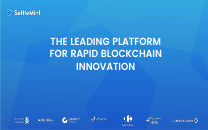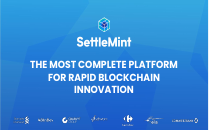
SettleMint
Founded Year
2016Stage
Series A - II | AliveTotal Raised
$21.38MLast Raised
$15.6M | 2 yrs agoMosaic Score The Mosaic Score is an algorithm that measures the overall financial health and market potential of private companies.
-51 points in the past 30 days
About SettleMint
SettleMint is a Blockchain-Platform-as-a-Service company that operates in the technology sector. The company's main service is to provide a platform that simplifies the integration of blockchain technologies into applications, offering a suite of APIs, developer tools, and frameworks. This service primarily caters to the needs of businesses across various sectors, including banking and financial services, supply chain management, insurance, and healthcare. It was founded in 2016 and is based in Leuven, Belgium.
Loading...
SettleMint's Product Videos


ESPs containing SettleMint
The ESP matrix leverages data and analyst insight to identify and rank leading companies in a given technology landscape.
The enterprise blockchains market is a space where technology vendors offer solutions to businesses looking to digitize their processes, systems, and assets. These solutions aim to improve efficiency, reduce costs, and increase transparency by leveraging blockchain technology. The market offers a range of platforms that cater to different industries and use cases, such as capital markets, supply c…
SettleMint named as Outperformer among 15 other companies, including IBM, Oracle, and Intel.
SettleMint's Products & Differentiators
Blockchain Application Development Platform
SettleMint is the one-stop blockchain transformation platform to build, integrate, and launch any blockchain application from end to end. Here are the layers in our platform that encapsulates the entire Web3 dev stack: 1) Infrastructure & Node Management 2) Private & Public Chain-Agnostic Support 3) Smart Contract Development in one environment 4) Consortium as a Service 5) GraphQL Middleware On-Chain Data Indexer 6) Key Management Solutions 7) IPFS Decentralised Storage 8) AWS S3 MinIO Centralised Storage 9) Visual Programming Systems Integration Interface 10) Hasura Engine On-Chain & Off-Chain Data Management 11) Cloud & On-Premises Deployment These layers are supported by the platform’s observability, orchestration and deployment engines.
Loading...
Expert Collections containing SettleMint
Expert Collections are analyst-curated lists that highlight the companies you need to know in the most important technology spaces.
SettleMint is included in 3 Expert Collections, including Regtech.
Regtech
1,453 items
Technology that addresses regulatory challenges and facilitates the delivery of compliance requirements. Regulatory technology helps companies and regulators address challenges ranging from compliance (e.g. AML/KYC) automation and improved risk management.
Blockchain
11,838 items
Companies in this collection build, apply, and analyze blockchain and cryptocurrency technologies for business or consumer use cases. Categories include blockchain infrastructure and development, crypto & DeFi, Web3, NFTs, gaming, supply chain, enterprise blockchain, and more.
Fintech
13,396 items
Excludes US-based companies
Latest SettleMint News
Aug 25, 2024
Perspectives: How blockchain tracks food across the supply chain and saves lives 26th August 2024 By Contributor | contact@foodticker.co.nz | @foodtickernz A blockchain-run food supply chain would also resolve issues around data privacy and security within the sector, according to SettleMint founder Matthew Van Niekerk. The blockchain can help grow more resilient food supply chains. Image: Unsplash/Markus Spiske Efficiently run food supply chains can positively impact communities and lives across the globe. Real-time tracking supports sustainability, prevents food waste, and ensures compliance with environmental, social and governance (ESG) standards. Communication throughout the supply chain can help producers earn fair compensation for their efforts. Ultimately, being able to track food from source to stomach improves the health and wellness of communities everywhere. Conversely, companies taking a traditional approach to food supply chain management face challenges to efficiency, security and transparency. The consequences can be dire, from food waste to death by contamination. There is a solution that can not only improve food supply chain management, but also increase the quality of life for everyone around the globe. Blockchain technology can provide much-needed transparency, traceability and privacy, as well as co-ordination across disparate parties, enabling greater food access and quality improvements across the global supply chain. Food supply chain challenges One company that has felt the challenges of today’s approach to supply chain management is Silal. Despite being an established player in the agritech space known for its commitment to quality and freshness, Silal Fresh, the fresh produce division of Silal, had trouble tracing its products across their supply chain. Gaps in traceability may pose challenges to food safety in terms of identifying where issues regarding food quality originated. Traceability issues aren’t the only challenges food suppliers and retailers face today. Other hurdles to better food quality and delivery include: Lack of communication: Even though goods pass from touchpoint to touchpoint along a supply chain, there’s often a lack of communication between them. In fact, 45% of supply chain leaders only have visibility to their first-tier suppliers or no visibility at all, and only 7% have multi-tier transparency . This results in a lack of supply-chain resiliency, making it hard for retailers to anticipate disruptions simply because they don’t know they’re coming. It also results in an inability to efficiently track and trace items in real time, as well as difficulty in proving the provenance of goods. A lack of tracking results in a lack of quality assurance, as well as the inability for thorough compliance reporting. Finally, a lack of communication can result in a lack of access to financing for upstream suppliers who remain cut off from downstream financiers. Lack of privacy: Across today’s supply chain, there’s a lack of symmetry when it comes to information-sharing. Upstream suppliers will be more likely to withhold information about their operations, pricing and sourcing to keep a competitive advantage. However, downstream retailers want to know this information about their products and goods. Unfortunately, legacy data management tools often lack the ability for such granular control over information-sharing. Lack of security: Another supply chain challenge is keeping the system secure, especially when centralized servers are vulnerable to attacks that can easily impact the entire supply chain. Third-party vendor risk is an increasing challenge today, with at least 56% of cybersecurity incidents happening in the supply chain . How blockchain nourishes supply chains How did Silal Fresh transform its approach to supply chain management? Recognizing the need for a better solution to provide the transparency and traceability they needed, Silal Fresh turned to the blockchain. Integrated into blockchain-based management system, supply chain providers record every touchpoint of a good or product into the ledger, so everyone across the chain can gain a clear view of that good’s journey. Built on a blockchain backend, Silal Fresh adopted a comprehensive traceability solution that utilizes consumer apps, a web-based dashboard, and integration with existing supply chain management systems. This significantly improved identifying and flagging delays in their deliveries, as well as increased satisfaction, trust and brand loyalty. They even added tracking to each piece of produce so that a consumer could pick up a vegetable, scan a QR code, and see that food item’s journey. Silal Fresh isn’t the only company that recognizes the power of blockchain solutions: 86% of supply chain leaders believe they offer a competitive advantage, according to our State of Blockchain Transformation: Supply Chain report . Blockchain also allows supply chain participants to create a network, with each participant as a node. This can provide that granular information-sharing missing from today’s legacy systems. For example, universal permissions can be granted for data that supports sustainability measures and can be restricted for sensitive data around distributor costs. Its distributed nature also enhances the security of that supply chain as well.
SettleMint Frequently Asked Questions (FAQ)
When was SettleMint founded?
SettleMint was founded in 2016.
Where is SettleMint's headquarters?
SettleMint's headquarters is located at Arnould Nobelstraat 38, Leuven.
What is SettleMint's latest funding round?
SettleMint's latest funding round is Series A - II.
How much did SettleMint raise?
SettleMint raised a total of $21.38M.
Who are the investors of SettleMint?
Investors of SettleMint include Medici Ventures, Molten Ventures, Fujitsu Corporate Venture Capital, OTB Ventures, Bloccelerate and 6 more.
Who are SettleMint's competitors?
Competitors of SettleMint include Finboot, QuickNode, Viveel, SIMBA Chain, AstraKode and 7 more.
What products does SettleMint offer?
SettleMint's products include Blockchain Application Development Platform.
Who are SettleMint's customers?
Customers of SettleMint include AB InBev, Coca Cola Hellenics, Jharkhand Seed Distribution (India) and Audencia.
Loading...
Compare SettleMint to Competitors
Alchemy focuses on Web Three development. It offers a platform that provides application programming interfaces, software development kits, and tools to build and scale web three applications, enabling faster transactions and real-time data for custom events. The company primarily serves the blockchain and decentralized application (Dapp) sectors. It was founded in 2017 and is based in San Francisco, California.
mintBlue is a company focused on providing enterprise infrastructure for decentralized storage and authentication, operating in the blockchain technology sector. The company offers services such as immutable storage and identity authentication, enabling organizations to have absolute control over their data. mintBlue's services are primarily utilized by product teams in various sectors, particularly those requiring large-scale data control. It was founded in 2021 and is based in Amsterdam, Netherlands.
Spyce5 operates in the blockchain technology sector, focusing on creating a decentralized network that connects hybrid chains. The company's main offering is the HAVN ecosystem, which allows for the interoperability of hybrid chains and is powered by the HAVN token, serving as fuel for running these chains. Additionally, Spyce5 provides a self-service launchpad for easy deployment of hybrid chains, advanced Web3 APIs, and access to a decentralized pool of validators for enhanced performance and scalability. It was founded in 2022 and is based in Berlin, Germany.

Consensys operates as a blockchain and web3 software company to specializes in decentralized web technologies. The company offers a suite of products including a self-custodial wallet, development tools for Ethereum, smart contract auditing, and Ethereum scaling solutions. It primarily serves developers and organizations within the blockchain and cryptocurrency sectors. Consensys was formerly known as Capital Platinum Systems. It was founded in 2014 and is based in Brooklyn, New York.

SIMBA Chain specializes in decentralized data exchange solutions within the blockchain technology sector. The company offers secure, reliable, and verifiable data interactions across various systems, focusing on identity management, multi-vendor data sharing, and third-party data verification. SIMBA Chain primarily serves government and enterprise sectors with its blockchain-based data exchange and verification services. It was founded in 2017 and is based in Plymouth, Indiana.
Kaleido operates as an enterprise-grade blockchain and digital asset platform operating within the technology sector. The company offers solutions for building and managing blockchain networks and digital assets, with a focus on simplifying the adoption of web3 technologies for organizations. Kaleido provides a suite of services including multi-region, multi-cloud blockchain networks, digital asset platforms, and web3 middleware, all designed to meet the stringent security and compliance needs of enterprises. It was founded in 2017 and is based in Raleigh, North Carolina.
Loading...